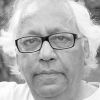Asma Jahangir: The five-foot giant

In a land with too few heroes, a single death can diminish us all. With Asma Jahangir’s untimely demise, Pakistan lost a fearless warrior for human rights and dignity, while her friends lost a witty and loyal companion who stood by them in good times and bad.
I met Asma and her husband Tahir Jahangir — known universally as TJ — in the mid-1970s, shortly before they got married, and we have been friends ever since. In all this time, I had always known Asma to be so full of energy that when she had a bout of cancer surgery a couple of years ago, it came as a huge shock to her family and friends.
But with characteristic courage, she faced her illness and carried on. When she and TJ came with us on an expedition into Sri Lanka’s hill country over a year ago, I expected her to slow down. Not a bit of it.
Oddly, the last time I met her was also in Sri Lanka less than three months ago when she had come to attend a meeting of the South Asia Human Rights organisation that she had helped set up. We had invited friends and their family to a restaurant, and asked Asma to join us. There she was, in the midst of three generations of Jayawardenes, regaling them all with stories, and engaging with them individually.
When she was with friends, she never took herself seriously, or made a big deal about her fame. Until I read all the tributes and condolences that have poured in since her death, I had no idea of the many honours foreign governments and international organisations had bestowed on her.
This recognition was probably useful in ensuring her safety in a country where journalists and human rights activists are routinely beaten up and “disappeared” by shadowy state operatives. Asma’s family and friends were obviously concerned about her security, but she refused to retreat into a bunker mentality.
I recall watching her on one TV chat show when she called generals who staged coups “political duffers” who had no idea about the ground reality of Pakistani politics. While many of us share this view, few have the courage to state it as bluntly. But this diminutive, gutsy woman kept giving us lessons in speaking truth to power.
The establishment mindset she fought against is captured in a recent email I received from a retired colonel. As this was the copy of a letter sent to the editor of Dawn, and hence meant for publication, I have no qualms in quoting from it:
“In spite of the (undeservedly) [sic] praise showered upon her by the so-called pseudo intellectuals of Pakistan; in spite of the eulogising of her by the Tom, Dick and Harries of the paid anti-Army media… it would be hypocritical on my part not to say ‘Khas kum jehan pak’.” (The less rubbish, the cleaner the land).
I was rather rude in my reply, reminding him that when he died, nobody but his immediate family would mourn his passing. But the retired officer’s hatred of Asma symbolises the gulf that has opened up between the security establishment and civil society.
As a counterpoint to this vicious little missive, here’s a quote from John Bunyan’s famous 1684 hymn (I have taken the liberty of altering the gender of the original):
“Whoso beset her round/With dismal stories/Do but themselves confound/Her strength the more is/No lion can her fright/She’ll with a giant fight…”
And Asma certainly took on the giants singlehandedly in battles conducted in courtrooms, TV studios, newspaper articles and the streets of Pakistan. Judges, generals and politicians all felt the lash of her righteous tongue as she fought for the rights of the weak and the vulnerable.
Despite her criticism of Benazir Bhutto’s government, the two women remained close friends. In fact, the assassinated PM offered Asma a Cabinet position on several occasions. She refused because being part of the government would curtail her freedom to criticise it.
No personal tribute to Asma would be complete without a mention of TJ’s supportive role. In a country where men avoid relationships with strong, independent women, TJ stood by Asma when she went to jail, or confronted the state’s security apparatus.
When Benazir Bhutto was assassinated, my late mother’s Christian carer wept and said she and her community had been orphaned. I can imagine her shedding tears at Asma’s death now.
By arrangement with Dawn

